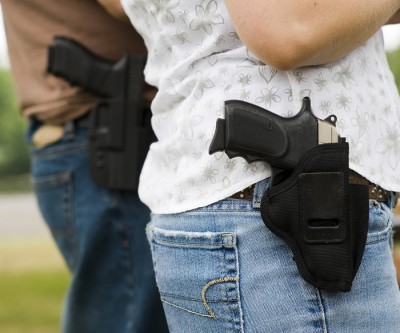
Image source: MLive.com
The social divide over the Second Amendment rages over the country, much like the wildfires tear through the forests of the Southwest. Fed by school shootings and liberal lies, it’s difficult to rationally answer the question of whether restrictions should be placed on gunowners.
So let’s start from the beginning. The Second Amendment of the greatest government document in the world’s history — the United States Constitution — states that:
A well regulated Militia, being necessary to the security of a free State, the right of the people to keep and bear Arms, shall not be infringed.
What’s interesting about this language is that it states that the right to bear arms SHALL NOT be infringed. The Founding Fathers placed a bright-line prohibition on infringement of the right. They knew the difference between an outright prohibition and the providing to the federal government the ability to place reasonable restrictions on a right. For example, the Fourth Amendment prohibits “unreasonable” search and seizure.
Until 2010, the significant weakness of the Second Amendment was that, in some minds, it did not apply to state or local governments. These governments were free to make any regulations their state supreme courts held acceptable under the state constitutions. That’s why states like New York and California could virtually ban their citizens from bearing arms. But it all changed in 2010, when the United States Supreme Court decided McDonald v. Chicago.
Low Cost Way To Defend Yourself Against Lowlife Criminal Scum!
This case held that the Second Amendment was “incorporated.” This legal term means that the states and local governments now must follow the limitations of the federal Constitution’s Second Amendment, and that state laws cannot be more restrictive than those allowed by the Second Amendment.
If you haven’t heard about McDonald v. Chicago, don’t chastise yourself. First, the liberal media ignored it, because it did not fit in with their narrative of ever more restrictive gun laws. Second, just because the Supreme Court held that the Second Amendment was incorporated, does not mean that all state and local gun laws violative of the amendment are removed from the criminal codes. Absent voluntary removal from state and local criminal codes, the laws remain in effect until each individual law is challenged in court. This means that a person has to break the law, begin to suffer the consequences, and then have the patience and resources to challenge the law in court. Remember, during this time, the person will be a convicted felon, in prison, possibly with a destroyed career and absence from family.
I am not exaggerating. In the mid-20th century, when the Supreme Court finally held that school segregation was unconstitutional (an unpopular decision to many at the time), schools did not magically desegregate. It took 50 years of litigation in federal courts to slowly desegregate schools through court judgments and federal receiverships of schools. So the battle to remove unconstitutional gun control laws is just beginning. The only difference is that now each one will have to receive scrutiny under federal constitutional law, not just state constitutional law.
And unfortunately, even though the federal Second Amendment is sometimes less restrictive than some state laws (like New York and California), the Supreme Court has no problems with the federal government infringing on the right to bear arms. Contrary to plain language, it has adopted a reasonableness standard for regulations.
To summarize, my opinion is that no government entity has the right to infringe on possession of firearms. Nevertheless, our Supreme Court has decided otherwise. So, removing the discussion from basic constitutional law to public policy in light of the Supreme Court’s view, let’s discuss a few limitations on firearms that make sense.
Convicted Felons
Federal law and some states, like California, prohibit convicted felons from possessing arms. In some cases, the rationale for this prohibition seems reasonable. If someone is convicted of a crime where a gun is used for violence, such as murder or assault, it makes sense that person can’t be trusted to use guns responsibly. However, laws that prohibit all felonies from possessing arms, like federal law and California law, seem excessive. If someone is convicted of lying to the SEC about a securities insider trading law, I’m not sure that has anything to do with gun usage. Any prohibitions of felon firearm possession should be directly related to a crime that involved violent use of firearms.
Insane or Mentally Incompetent Persons
Not surprisingly, insane people or those adjudged mentally incompetent are barred from possessing firearms. This makes sense. Firearm ownership and use requires responsible use, and some people don’t have the mental capacity to make reasoned judgment about responsible usage.
Firearm Free Zones
Generally, you cannot carry a weapon in a school or court building. While superficially this may seem like a good idea, it suffers from the flaw that many laws that liberals make suffer from — it only affects law-abiding people. If someone is intent on shooting classmates or gunning down the opponent in a family support hearing, that person cares little for the law. Unfortunately, there will be no armed, responsible people to help (other than law enforcement, which may or may not be present).
Conclusion
I believe any law that infringes an American’s right to bear arms is unconstitutional. However, the Supreme Court disagrees. Forced to deal with that reality, the only gun control laws I favor on a public policy basis are those that prevent either those who have proved they can’t use firearms responsibly, or are mentally incapable of it. But I can’t favor the nearly 20,000 gun control laws that merely make gun ownership and possession more difficult (if not impossible) and more expensive for law-abiding citizens.
Do you agree or disagree? Tell us in the comments section below.
Sign up for Off The Grid News’ weekly email and stay informed about the issues important to you
 Off The Grid News Better Ideas For Off The Grid Living
Off The Grid News Better Ideas For Off The Grid Living




